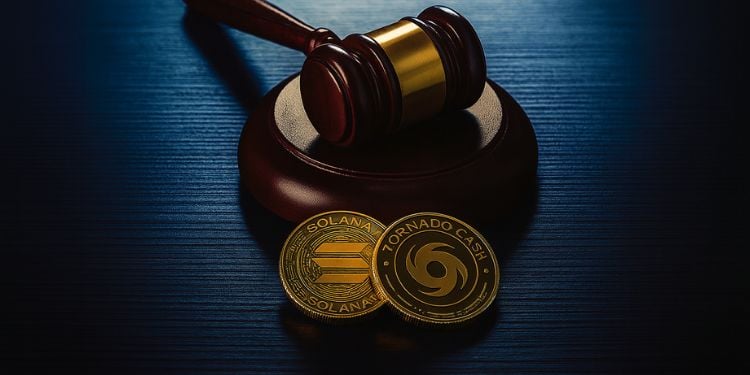- Solana Policy Institute donated $500K to support Tornado Cash developers Roman Storm and Alexey Pertsev in ongoing legal battles.
- Storm faces up to five years in U.S. prison after a partial conviction, while Pertsev appeals a five-year Dutch sentence.
- Crypto groups including Solana and Ethereum are uniting to defend open-source developers and push for legal protections.
The Solana Policy Institute has stepped into one of the most controversial legal battles in crypto, pledging $500,000 to help Tornado Cash developers fight their cases in U.S. and European courts. Roman Storm and Alexey Pertsev, the two developers behind the Ethereum-based privacy tool, remain under fire for building open-source software that governments claim was misused by sanctioned groups. For many, the case isn’t just about Tornado Cash—it’s about whether coding itself can be criminalized.
This pledge from Solana joins earlier donations from the Ethereum Foundation and others, bringing the spotlight back on crypto’s fragile balance between privacy, decentralization, and regulatory control. It also signals a rare moment of unity across rival chains, with the industry rallying behind developers whose work is now seen as a litmus test for open-source freedom.
Roman Storm Faces U.S. Prison Time as DOJ Considers Retrial
In Manhattan, Roman Storm was convicted of operating an unlicensed money-transmitting business tied to Tornado Cash. The jury found him guilty on one count, leaving him facing up to five years in federal prison. Two other charges—money laundering conspiracy and sanctions violations—ended in a hung jury, but the Department of Justice hasn’t ruled out a retrial. That means Storm’s legal ordeal could drag on much longer.
Storm has said he needs $3.5 million for his legal defense but has raised just over half of that so far. Donations from groups like Solana’s policy arm aim to close this gap and keep him in the fight. The case has already drawn outrage across the crypto world, with many arguing that punishing developers for writing code—rather than directly handling user funds—sets a dangerous precedent.
Pertsev’s Dutch Conviction Adds Global Pressure to Privacy Debate
On the other side of the Atlantic, Dutch developer Alexey Pertsev continues to battle a five-year sentence after being convicted of money laundering in 2022. His arrest and trial centered on Tornado Cash’s alleged use by North Korea’s Lazarus Group. Though no evidence showed Pertsev intended to enable crime, prosecutors successfully tied the tool’s neutrality to illicit activity. Pertsev remains under electronic monitoring while his appeal moves forward.
His conviction came right after the U.S. Treasury sanctioned Tornado Cash, a move that was overturned in 2025 after a civil court challenge. But the Dutch ruling still stands, leaving Pertsev in limbo while international debate rages over whether developers should bear responsibility for how decentralized tools are used.
Solana Policy Institute Joins Push for Developer Protections
Created in 2025, the Solana Policy Institute is already making headlines by pushing for legal reform that shields developers from liability when they build neutral software. Its donation to Tornado Cash’s defense fund is both symbolic and practical—it shows that even rival ecosystems recognize the stakes in this case.
The institute also joined more than 100 organizations in sending a letter to the Senate Banking Committee, urging lawmakers to carve out protections for decentralized developers in upcoming crypto legislation. Their message was blunt: if laws don’t change, innovation could be stifled, and open-source contributors may think twice before shipping code.
Tornado Cash has become more than a courtroom story—it’s the flashpoint for crypto’s identity. The way courts and lawmakers handle Storm and Pertsev will shape not just privacy tools but the future of decentralized development itself.














